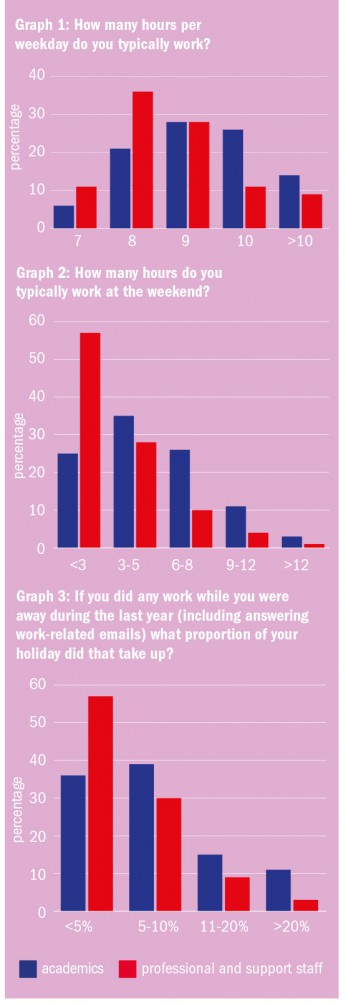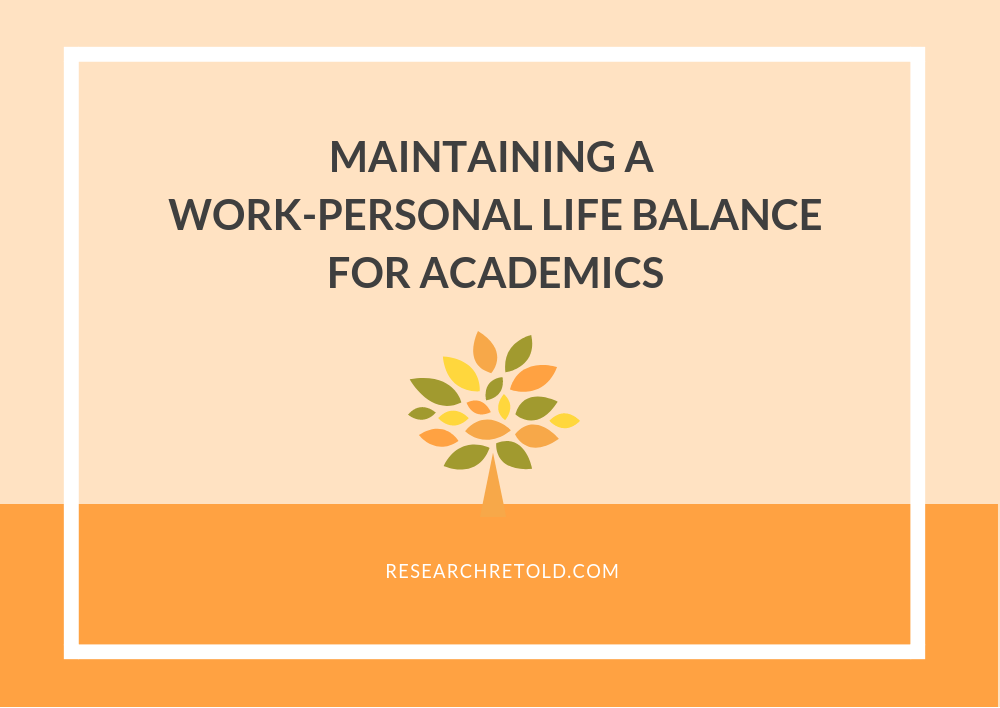In this blog post, we share some insights, tips and practical resources about maintaining a work-personal life balance as an academic.
A work-personal life balance is essential for overall good quality of life. It also brings many benefits both to scholars’ work productivity and their personal activities and relationships (source). It’s not news that academics have a lot on their plate. Thus, they may struggle to find time for their personal life and leisure activities. Committed researchers find it difficult to narrow down their working programme. The work never stops and they are always thinking about new ideas.
A Times Higher Education study that focuses on responses from academics in the UK, the US and Australia, revealed that UK researchers seem to work the hardest. 71% of scholars responded they work nine hours a day or more, and 15% more than 10 hours. However, UK academics are less likely to work more than five hours during the weekend and they also work less during holidays.
What does it mean to have a work-personal life balance?
Everyone talks about the need to maintain a balance between work and our personal life. But what does it actually mean and why would this balance be beneficial?
A work-personal life balance means controlling the amount of time allocated for work to make time for family, friends, or leisure activities. According to The Balance Careers, more and more employers have implemented various methods and policies such as flexitime, job sharing or working from home. In this way, employees’ lives become easier, helping them achieve a work-life balance.
Improving the balance between work and ‘play’ can bring many benefits. Employees feel more in control of their lives and start to enjoy work. Thus, work productivity increases, fewer people take days off, and employees’ health and well-being get better. A 2018 study revealed that 82% of those surveyed say that working in a company that allows high flexibility has positive impacts on their well-being, health and overall happiness. Similarly, 81% reported being more productive at work due to having a more flexible work schedule.
3 insights on work-life balance for academics
Academics usually dedicate their entire career to in-depth research and expanding their knowledge in a specific subject. It could be argued that working as an academic is an ongoing job – ideas can come up anytime, in the evenings, at the weekends or on holiday.
Jobs.ac.uk claims that the working day of an academic expands instead of contracting and that personal activities like family-time or self-improvement come second.
Researchers are dedicated to their work. They might find it difficult to switch off and not think about their work, meaning that their job does not follow a typical 9-5 work programme.
Times Higher Education conducted the first major global survey of university staff opinions on work-life balance. The results highlight that academics struggle to find time for family and personal relationships because of more and more work.
The following findings were taken from The Times Higher Education survey published in February 2018 in the article ‘Work-life balance survey 2018: long hours take their toll on academics‘.
The first key finding we extracted is the connection between workload and mental health. Working too much can lead to severe consequences such as anxiety, depression or a high level of stress. 31% male and 26% female academics responded that work has a negative impact on their mental health.
The second key finding we identified is the impact that the academics’ workload has on having children and vice-versa. Female researchers have this issue more than males, with 43% saying that having children holds back their careers. Also, female academics are less likely to have children than male academics. 63% of female researchers who do not have children say this is partly because they fear it would be incompatible with their career.
The third key finding we found interesting is that the majority of university staff have thought of working in a different sector because of an unequal balance between work and personal life. 85% of both academics and professional staff say that they have considered changing their career. 31% of academics believe their work-life balance would improve if they worked in another field and 21% believe another career would be less stressful.
Source for Graph 1: Times Higher Education, Work-life balance survey 2018: long hours take their tolls on academics. Available at: https://www.timeshighereducation.com/features/work-life-balance-survey-2018-long-hours-take-their-toll-academics

What support is available for UK academics?
Universities represent a very good start for maintaining a work-personal life balance for academics. Counselling services are specifically targeted toward researchers who encounter various problems in their life.
Yvonne Belle, the administrator of the Staff Counselling and Psychological Support at the University of Leeds, told us more about how they can help academics achieve a work-personal life balance:
“We are an internal service and have developed knowledge and understanding about the sector and how it works and the demands of academic roles impact on work-life balance and mental health.
We provide a range of services including 1-1 consultation, counselling and coaching, personal resilience workshops and mindfulness training. All the services are available to and are engaged with by academic staff as well as other roles.”
Moreover, they provide useful self-help resources which are available to any academic, not only to the University of Leeds staff. They are all meant to lead to a better, limited stress life which will make academics not only focus on their research, but also on their personal life.
Free resources for maintaining a work-life balance
1. The MoodGym training programme
Moodgym is a self-help tool created to help users prevent and control symptoms of depression and anxiety. It is an online self-help guide that teaches skills based on cognitive behaviour therapy, a talking therapy that can help you overcome your issues by changing the way you think and act.

2. Stress Busting platform
Stress Busting is a website that offers information about the symptoms, causes and treatment of stress. Besides the informative part, Stress Busting provides three different tests (stress, personality and symptoms) that determine your level of stress. The website also offers information about 32 different stress busting treatments from acupuncture and laughter therapy to Reiki and Tai Chi. This comprehensive website is a great tool to learn more about stress busting tips and tricks.

3. Podcasts for mental health and wellbeing
The Mental Health Foundation offers a range of wellbeing podcasts that are free to listen to and are available online. Hosted on Soundcloud, the podcasts cover a wide range of topics from mindfulness, nutrition and mental health.
4. Click Relationships to improve relationships
Click Relationships is a ‘do it yourself’ relationship support service. The platform shares research and practical experience for parents and couples who want to work on their relationships for themselves. The site provides a wide range of articles, self-assessment tools, activities, quizzes, exercises, and courses to help people to improve and strengthen their relationships.
5. Parental leave to make sharing of family tasks easier
The University of Leeds offers a range of benefits for its academic staff, covering childcare; electronics; finance and welfare; food, drink and entertainment; health, fitness and beauty; as well as shopping and travel. There may be scope for your academic institution to offer similar advantages.
Specifically related to childcare, the University of Leeds offers childcare to students and staff members at the University of Leeds, through the Bright Beginnings Childcare Centre. The centre can accommodate up to 168 children aged between 3 months and 5 years. It also operates a Playscheme during the school holidays.
Moreover, the Children’s Holiday Camps, Kings Camps, is located on the university campus and runs children’s sports and activity day camps at the local campus gym during the school holidays for children aged 4-17. Children keep active with over 30 sports, games and activities across the week. Employees of the university benefit from discounted rates.
6. Union support for staff working in adult, further and higher education
The University and College Union (UCU) compiled a free document focused on “Supporting members with mental health conditions and issues“. This useful guide includes information on several mental health issues from depression, anxiety and phobias, to post-natal depression, obsessive compulsive disorders and schizophrenia. Moreover, the document covers specific issues about mental health in the workplace, such as negotiating reasonable adjustments and equality impact assessments.

Special thanks to Anca Coman, our Outreach Communication Officer, for compiling the research for this blog post, writing and editing it.

